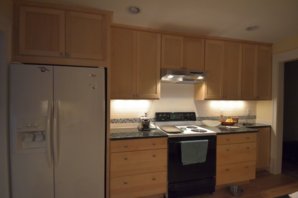The question is... are you going to sell your house?
If you're going to sell your house, just get prices from a few granite places and get some uba tuba or whatever. Buyers (and especially the realtors) want to see "granite", not "composite solid surface".
That said, we use composites pretty frequently, for everything from counter tops to window sills, reception desks, accent walls, you name it. There are several nice things about Corian. It's impervious, so it never needs sealed (granite should be resealed at least once a year). It can be worked with normal woodworking tools, including a router. It can be fabricated with integral backsplashes, integrals sink bowls, etc. It also will transmit light, so you can edge light it or even put a light under your kitchen sink to make it glow, etc.
Corian can be thermoformed... which is good (versatile) and bad (can't put hot things down on it). It patinas over time (and can be scratched), but can be resurfaced in place if you'd like to restore the original finish. Darker colors tend to require more maintenance.
You can put hot pots directly on granite. You can even use it as a cutting board, but it's hard on your knives.
There are a wide variety of Corian-like composite products. Corian is an acrylic composite, and typically has a solid color, speckled, or streaked/striped finish. DuPont also makes Zodiaq, which is a quartz composite. It's mostly quartz with an acrylic binder, so it looks like stone. It won't have grain like a natural granite or marble will (b/c it's made up of tiny pieces glued together), but it will be fairly uniform in color. Silestone is another well-known quartz composite manufacturer. Some companies embed straw or metal shavings or glass fragments in the composite. The possibilities are fairly endless.
Natural stones and composites both vary tremendously in price, depending on what color you want. So there's no hard and fast rule about what's cheaper. Generally, I'd guess that you could get a cheap granite for less than the price of a composite, but for just one residential kitchen, I'd bet the cost difference would only be a few hundred bucks.





 and got laid.... all in the same day!
and got laid.... all in the same day!